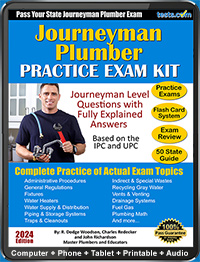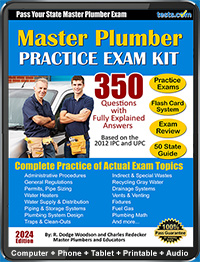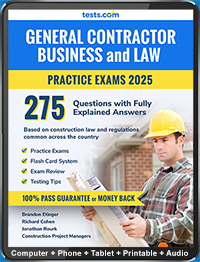Journeyman Plumber Test Guide
| Journeyman Plumber Test Summary
|
|
|---|---|
| What: Journeyman plumber licensing exam | |
| Who: State or local governments require the exam as part of the licensing process. | |
| Where: The test are typically given at a testing company location. | |
| When: Plumbing exams are usually given a few times a year. | |
| How: The exams are either computer or paper based. | |
| Type: The exams use both multiple choice and true-false questions. | |
| Why: The exams help ensure competence and protect the public. | |
| Time: The tests are usually 2 - 5 hours long. | |
| Language: English | |
| Preparation: Study guides, practice tests, flashcards, courses | |
| Cost: Varies | |
Most states require journeyman plumbers to be licensed to work in the state as a plumber. The purpose of requiring a license for plumbers is often stated in terms of public safety and consumer protection.
The licensing agency is typically a state government but a few states leave the licensing up to local municipalities at the city and county level. New York, Pennsylvania, Illinois and Missouri are examples of states that regulate plumbing at the local level. To find out if your state regulates the plumbing trade on a state-wide basis or at the local level, see Tests.com's state-by-state reference guide.
To help you get your Journeyman license on the first try, we recommend the Journeyman Plumbing Practice Exam which neatly covers all actual test sections.
As mentioned above, most states have state laws that regulate the plumbing trade on a state-wide basis. The agency responsible for regulating the industry is typically a state plumbing board under the state department of labor or other commerce department. Further, there are a few states that do not regulate journeyman or master plumbers in the traditional way, but regulate only contractors. When planning your career as a plumber, you will have to first determine whether the state or municipality where you wish to work regulates plumbers in the traditional trade language or whether it regulates the building trades in terms of contractors. The difference can be more than semantic, as the qualifications to become a plumber can be different from one state or municipality to another, in part, depending on how the state characterizes the trade in question.
There are two main requirements to qualify for a license as a journeyman level plumber. The first is the experience requirement and the second is the exam requirement.
Experience Requirement
States and municipalities often require candidates to establish that they have worked a certain amount of time as an apprentice under the supervision of a licensed journeyman or master plumber. The requisite time periods can differ but a typical requirement is one year. The time requirement can be measured in hours as well. To establish the time spent as an apprentice-level plumber, the licensing agency often requires the supervising plumber to fill out a form and certify that the candidate worked the time asserted in the application. Some states require all candidates to undergo an accredited apprentice program prior to apply for the license. Often, the experience requirement can be met by either education or time working under a supervising plumber. For instance, if a candidate went through an approved apprenticeship program, the number of hours he has to spend in the field may be reduced.
Exam Requirement
Plumbing exams are widely used across the country as part of the licensing process. They all involve approximately 100 questions and use a multiple-choice and true/false format. Many of the questions will be situation based, meaning the question will ask you to assume a number of facts and ask you to figure out the answer based on the facts and your knowledge of the plumbing code. The journeyman plumbing test will typically only involve trade knowledge questions. The trade knowledge sections are often broken down along the following lines:
- Drainage Waste
- Venting
- Hangers and Supports
- Water Supply Systems
- Backflow Prevention
- Storm Drainage Systems
- Plumbing Fixtures, including Water Heaters
- General Knowledge and Regulations
- Interceptors and Traps
- Isometric Analysis
- Septic and Sewer
- Joints and Connections
The states that regulate both journeyman and master plumbers will usually not involve questions of business and law in the journeyman test, though it can happen. For instance, in states that regulate journeyman level plumbers in terms of contractors, the candidate may have to address questions regarding business and law as it relates to plumbing. The business and law sections can cover such subjects as:
- Business management
- Permitting
- Bidding Process
- Contracting
- Insurance and Bonding
- Accounting and Tax Matters
- Worker Safety
- Labor Laws
- Environmental Laws
Journeyman level plumbers typically do not have to worry about a business and law section, as it is the master plumber who is responsible for permitting, contracting and supervising the work, but some jurisdictions do expect their journeyman candidates to address such subjects. Candidates can get detailed information on what specific subject categories the test will address from the state agency giving the exam or from a testing company used by the state agency to administer the tests. There are often detailed information bulletins or candidate handbooks published with the exam breakdown and content. For specific information and direct links to such information, see Tests.com's state-by-state reference guides.
A candidate facing a journeyman plumber exam does not want to take it lightly, even if the candidate has much education or experience in the field. Test taking is an art in itself and sometimes very knowledgeable people fail tests simply because they were unprepared for the types of questions that were being asked. To prepare for your journeyman exam, obtain a study guide, flashcards and practice tests. Study on your own and meet with a friend who is either studying herself for the exam or who has some familiarity with the material and ask those persons to use your code book to quiz you. Always pay special attention to what the question is asking, as it will limit the information sought after. Do not read into the question. Only answer what it is asked. Many jurisdictions hold open book tests, meaning you can take your plumbing code into the test with you. Do not let the opportunity to have your code book with you in the exam make you overconfident or short on preparation. Answering multiple choice questions in a short period of time will lead to stress and if you do not have a grasp of the material or how the tests work, you will find yourself confused and the open book may only cause you more confusion.
Tests.com has worked with Dodge Woodson, master plumber and educator, to design a plumbing practice test to help you prepare for your journeyman licensing exam. Tests.com's TestSim online interactive platform allows you to tailor tests to the subjects you want to study and to form tests to fit your study schedule. Form tests of 50, 100, 150 or even hundreds of questions. Get instant scoring and review. The answers are fully explained for ideal study. You can even simulate the actual exam by setting the number of questions and timer to the time period allowed for the actual test. Get experience reading multiple-choice quesitons and taking timed tests. Tests.com will help you pass your licensing exam and set you on your way to a successful career as a plumber.







